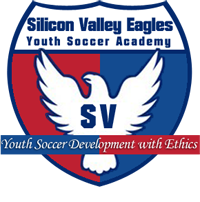Coaching Ethics and the Developmental Process
Ethics are the standards of conduct and moral behavior specific to an organization. Coaches affiliated with all youth soccer organizations in the USA fall under the umbrella of the United States Soccer Federation (USSF). The following statements refer to the ethical standards expected from US coaches involved in educating young children in soccer and seeking to understand the reasons for children’s participation in and growth through youth sport.
1. Ethics with regard to coaching for “Process” versus “Product”: Coaches who place the outcome of games ahead of the ongoing needs of the participants are being unethical.
The primary reasons children play sports are to participate and learn new skills, to be with friends, to compete with and against others, and to have fun. They enjoy learning from new experiences and, as time goes on, from direct instruction. They do not like being scolded or abused for making mistakes and they would rather play in a losing effort than sit on the bench during a victory. They would also rather play in a close game than in a blowout. Very young children rationalize winning and losing to working hard; older children equate winning and losing with their skills and abilities, directly influencing their selfconfidence. Care must be taken to allow players between the ages of five and twelve the opportunity to become skillful and game savvy by focusing on their long-term development rather than their win-loss record.
2. Ethics with regard to Soccer Rules: Coaches who bait, antagonize, or otherwise challenge the decisions of the officials are being unethical.
It is the responsibility of the coach to understand the basic rules of play and to strive to educate his or her players to perform within the letter and spirit of the rules to the best of their abilities. Both novice and expert coaches, and especially those coaches who are also registered officials should appreciate that the application of the rules to the game is based on the interpretation of the officials. It is the coach’s responsibility to model good sportsmanship and to demonstrate respect for the game. It is also the responsibility of the coaches to monitor and control any form of referee abuse by players, parents and other spectators.
3. Ethics with regard to Playing Time: Coaches who play only their better players in an attempt to win games, and those who do not provide young players with reasonable playing time, or adequate rest, are being unethical.
Youth sport is not a miniature version of adult sport and all young players have a right to enough playing time (in our club 50% minimum playing time for every player between age 5 years and 10 years ), regardless of the status or level of a contest. Players who do not regularly participate are at higher risk of dropping out, and no youth coach can predict which talented or round or awkward young player will become the star of tomorrow once maturation, talent and desire are coupled with a good training environment. It is also regarded as unethical to over-play children in an attempt to bolster the chances of a club winning multiple games played on the same day, or over a number of days, as is often the case at tournaments. Players who are fatigued face a higher risk of injury, and players who play an excessive number of games over a prolonged period or months or years are at higher risk for burning out and developing overuse injuries. It is also true that players who face excessive playing demands are often hurried back from injury, with serious potential for chronic joint instability as a result.
4. Ethics with regard to Positioning: Coaches who restrict the movement of players in small-sided games in order to win games are being unethical. Coaches who rigidly organize players into formal positions to artificially separate them are guilty of over-coaching.
The ability of players to understand positions starts to emerge around age ten and develops rapidly over the next few years. Small-sided games that do not require a formal midfield organization are designed to provide age appropriate and ability appropriate competition for players under the age of eleven. The intent is for players to enjoy freedom of movement within the game, thereby learning how to create and use space within small-group environments. Small- sided games can also help coaches better appreciate their “curriculum” in working with young children. In addition, two key elements of team play at U-11 and above are support for the midfield and forward lines from the defenders, and the natural movement of defenders into midfield and forward positions to create numerical superiority around the ball. The practice of positioning “Goalie Guards” close to the penalty area and restricting these players from moving with the team is clearly intended to limit the loss of goals. Finally, the practice of positioning attacking players in front of the opponent’s goal to “Cherry Pick” does not help the team quickly transition to attack, nor does it help develop the important skills of playing with back to goal. Neither of these practices is in the best interests of the players.
5. Ethics with regard to Blowouts: Coaches who deliberately run up scores are being unethical.
Lopsided games in youth sports are inevitable and care must be taken to appreciate the sensitivity of young children to such events. Playing short-handed, adding players to the opponent’s team, playing key players out of position, sitting key players for longer periods, playing with limited touches, restricting scoring from close range, and only scoring from crosses are some possible options for dealing with blow-out situations. At the youngest ages, adult coaches should consider playing in goal to help the losing team gain some measure of stability or consolation.
6. Ethics with regard to Player Advancement: The coach who seeks to retain a player(s) who has outgrown the knowledge and abilities of the coach for the implicit or explicit purpose of winning games is being unethical.
Players improve by playing with and against other good players, through personal motivation and independent practice, through study, through observation, and through good coaching. By far, the most important factors in player development are coaching and environment. At the top level, the successful coach is one who develops players to their fullest potential and reaps the rewards through the play of the team. The successful youth coach, in contrast, helps individual players develop to their fullest potential, or to the limits of the coach’s knowledge, before moving them along to a higher level of play and a new learning environment. The unethical youth coach often seeks to covet his or her top performers for reasons of self-worth and personal gain, regardless of the short and long-term impact on the individual player.
7. Ethics with regard to Game Tactics: Coaches who use negative tactics and minimize the enjoyment of the players in order to win games are being unethical.
Winning youth soccer games is relatively easy. The coach who tells his or her players to take no risks with back passes; kick every ball forward; dribble the ball forward; stay behind the ball, or behind the half when playing as a defender; press the opposition into their half at every opportunity; and be very aggressive when defending, will win a higher percentage of their games. Youth coaches who play to win at all costs in this manner are guilty of practicing an insidious form of child abuse. The younger the players are when a coach displays this attitude, the less likely it is that they will ever experience the joy of actually playing soccer as it can be: An exercise in creative self-expression. It is quite easy to be “winning” youth soccer coach; it is much more difficult to be a “successful” youth soccer coach.
8. Ethics with regard to achieving Success by Recruiting: Coaches who recruit players as a convenient shortcut to “developing from within” are not only unethical, but also unprofessional.
The practice of recruiting good players to build a victorious youth organization often undermines the efforts of those coaches who understand the value and perils of building for long-term development. Yes, winning is enjoyable, but successful coaching is better defined as winning with an eye towards a competent end product. Player development takes at least 10 years, and embraces success and failure as necessary elements of the process. Perpetual victory is not in the players’ best interests; nor is club-hopping in search of meaningless trophies and awards. Players need to be challenged to persevere and aspire; and to learn the value of loyalty to good coaches, even when the organization is not always successful. The ethics of coaches who cut and recruit players in order to win must be scrutinized. Victorious youth soccer organizations are not always reflective of coaching competence.
9. Ethics with regard to Respecting the Game
Soccer has been played worldwide in one form or another for over 4500 years, and in the United States since 1869. Over five million American children now play youth soccer. The first official soccer rules were codified in London, England in 1863 and the World Cup is the world’s largest single sport event. It is the responsibility of each coach to demonstrate respect for the game by honoring players, spectators and officials, and by promoting positive character development to all young players in words and deeds. Coaches who fail to meet these standards by displaying poor sportsmanship and overreacting to the natural ups and downs of the game are being unethical.







